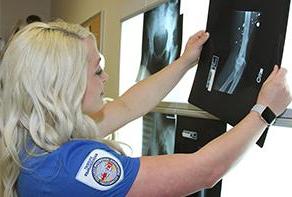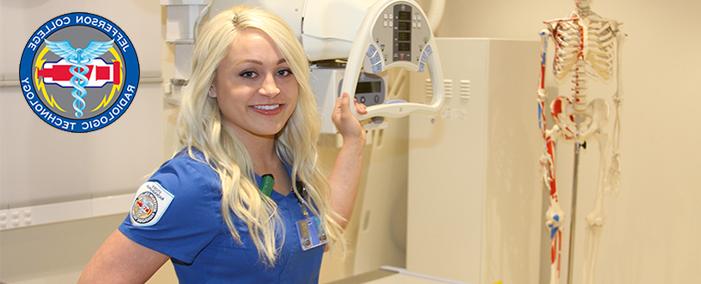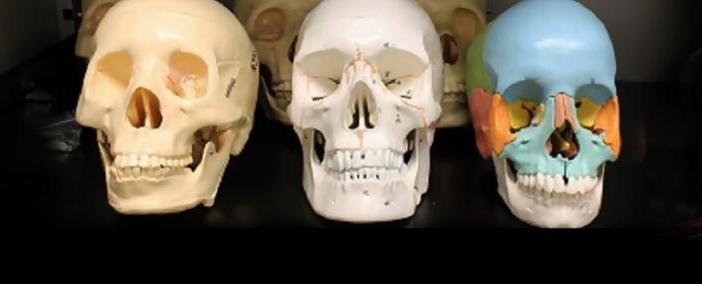You are here
Radiologic Technology

Application Process
Learn How to Apply

Future Opportunities
Explore Career Opportunities

Courses & Degree Plans
Official Institutional Course Guide, Degree Plan and Course Sequence
If you've ever had an x-ray, you've probably met a radiologic technologist. Radiographers use x-ray equipment to produce 2-D and 3-D images of the body's tissue, organs, bones, and vessels. Some radiographers specialize in computed tomography (CT), magnetic resonance imaging (MRI), mammography, ultrasound, nuclear medicine, or interventional.
A career in radiologic technology can lead in many directions. Radiologic technologists are needed in every healthcare setting. You could work in a large hospital, a suburban outpatient clinic, or a rural physician's office. You could specialize in dozens of clinical areas, from prenatal care to orthopedics. You could manage an entire radiology department, including its budget and personnel. You could teach, inspire new generations of radiologic technologists, or perform research that leads to breakthroughs in diagnostic imaging.
The AAS Radiography Program offers a comprehensive 18-month curriculum that prepares students for their American Registry of Radiologic Technologists (ARRT) registration/certification exam and entry-level radiologic technology positions. Many students begin working as student technologists during their fourth and fifth semesters at hospitals and urgent care centers.
In addition, the Program offers continuing education to students and registered technologists in the fields of CT, MRI, and Mammography. Please see the Program's advanced modalities post-primary certification page for more information.
View this message from the Program Director!
Follow us on Facebook.
Program Effectiveness Data, including the most recent five-year credentialing examination pass rate, five-year average job placement rate, and annual program completion rate, is available for public viewing by utilizing the link below or by visiting the Jefferson College JRCERT webpage.
Jefferson College JRCERT information page
Additionally, the Program Effectiveness Data yearly reports (5-year averages) are available below:
- Program Effectiveness Data 2015-2019
- Program Effectiveness Data 2020
- Program Effectiveness Data 2021
- Program Effectiveness Data 2022
Accreditation
The Jefferson College Radiologic Technology Program is an accredited program through the Joint Review Committee on Education in Radiologic Technology (JRCERT) and the North Central Association of Colleges and Schools Higher Learning Commission (HLC) and is a recognized accredited program by the American Registry of Radiologic Technologists.
The most recent JRCERT accreditation award letter was awarded on 7/27/2022 for five years. The next on-site visit will be scheduled for the Third Quarter of 2023. Accreditation Letter
More information on accreditation can be found on the following websites:
- JRCERT: www.jrcert.org
- ARRT: www.ARRT.org
The JRCERT assures employers and prospective students that our program provides educational excellence and patient and professional safety. It is the faculty’s desire to create the highest quality Radiologic Technology Program available. If a student has concerns with program policies or practices, please bring them to the attention of the Program Director or the Clinical Coordinator. Issues may be easily resolved once we are aware of them. The Grievance and Appellate Process can be found within the student handbook at the following link: Student Handbook.
If the complainant believes the program still to be in violation of JRCERT policies, the JRCERT may be contacted directly at: Joint Review Committee on Education in Radiologic Technology 20 N. Wacker Drive Suite 2850 Chicago, IL 60606-3182 (312) 704-5300, or at www.JRCERT.org.
JRCERT Standards for Programmatic Accreditation
Mission/Vision/Student Learning Outcomes
Full self-study and master plans can be accessed by contacting Interim Program Director, Stacy Wilfong, at swilfon2@hotelparacaes.net.
The Radiologic Technology Program is a chartered member of the Missouri Gamma Sigma Chapter of Lambda Nu, a national honor society for radiologic and imaging sciences.
Jefferson College’s Annual Security and Fire Safety Report is now available. This report is required by federal law and contains policy statements and crime statistics for Jefferson College. The policy statements address Jefferson College’s policies, procedures, and programs concerning safety and security, for example, policies for responding to emergency situations and sexual offenses.
Additionally, this report contains information regarding campus security and personal safety, including topics such as: crime prevention, fire safety, Jefferson College Campus Police Department enforcement authority, crime reporting policies, disciplinary procedures, and other matters of importance related to security and safety on campus. Also included are crime statistics for three previous calendar years which were reported to have occurred on campus, in or on off-campus buildings or property owned or controlled by the school, and on public property within or immediately adjacent to the campus.
This report is available online at: http://www.hotelparacaes.net/sites/default/files/PR/Web/Consumer-Info/2023/jeffco_asfsr_final.pdf.
You may also request a paper copy from the Jefferson College Police Department by phone at 636-481-3500 or at Jefferson College Hillsboro-802 Mel Carnahan Drive, Apartment 214, Hillsboro, MO 63050; Jefferson College Arnold-1687 Missouri State Road, Arnold, MO 63010; or Jefferson College Imperial-4400 Jeffco Boulevard, Arnold, MO 63010.

